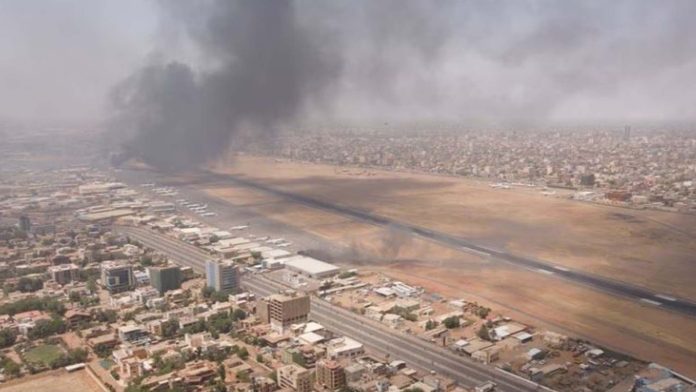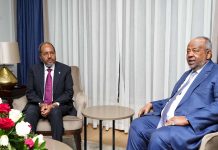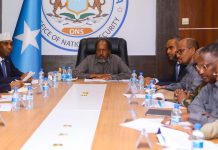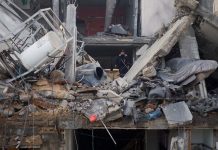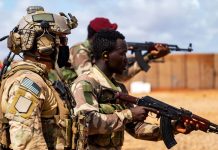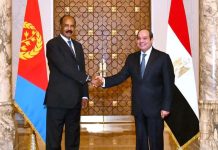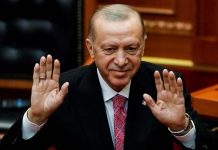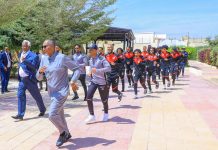Sudan’s army appeared to gain the upper hand on Sunday in a bloody power struggle with rival paramilitary forces, pounding their bases with air strikes, said witnesses.
At least 97 civilians had been killed and 365 injured since the fighting in Sudan started, said one doctor’s group.
The fighting erupted on Saturday between army units loyal to General Abdel Fattah al-Burhan, head of Sudan’s transitional governing Sovereign Council, and the paramilitary Rapid Support Forces (RSF), led by General Mohamed Hamdan Dagalo, known as Hemedti, who is deputy head of the council.
It was the first such outbreak since both joined forces to oust veteran Islamist autocrat Omar Hassan al-Bashir in 2019 and was sparked by a disagreement over the integration of the RSF into the military as part of a transition towards civilian rule.
Burhan and Hemedti agreed a three-hour pause in fighting from 4 p.m. local time (1400 GMT to 1700 GMT) to allow humanitarian evacuations proposed by the United Nations, the U.N. mission in Sudan said, but the deal was widely ignored after a brief period of relative calm.
As night fell residents reported the boom of artillery and roar of warplanes in the Kafouri district of Bahri, which has an RSF base, across the Nile river from the capital Khartoum.
Eyewitnesses told Reuters the army was renewing air strikes on RSF bases in Omdurman, Khartoum’s sister city across the Nile, and the Kafouri and Sharg El-Nil districts of adjacent Bahri, putting RSF fighters to flight.
The United States, China, Russia, Egypt, Saudi Arabia, the U.N. Security Council, European Union and African Union have appealed for a quick end to the hostilities that threaten to worsen instability in an already volatile wider region.
Efforts by neighbours and regional bodies to end the violence intensified on Sunday. Egypt offered to mediate, and regional African bloc Intergovernmental Authority on Development plans to send the presidents of Kenya, South Sudan and Djibouti as soon as possible to reconcile Sudanese groups in conflict, Kenyan President William Ruto’s office said on Twitter.
The eruption of fighting over the weekend followed rising tensions over the RSF’s integration into the military. Discord over the timetable for that has delayed the signing of an internationally-backed agreement with political parties on a transition to democracy after a 2021 military coup.
CLASHES IN KHARTOUM
A statement by the army said there were ongoing clashes in the vicinity of military headquarters in central Khartoum, and said that RSF soldiers were stationing snipers on buildings, but that they were “monitored and being dealt with.”
Earlier on Sunday, witnesses and residents told Reuters that the army had carried out air strikes on RSF barracks and bases in the Khartoum region and managed to destroy most of the paramilitaries’ facilities.
They said the army had also wrested back control over much of Khartoum’s presidential palace from the RSF after both sides claimed to control it and other key installations in Khartoum, where heavy artillery and gun battles raged into Sunday.
RSF members remained inside Khartoum international airport besieged by the army but it was holding back from striking them to avoid wreaking major damage, witnesses said.
But a major problem, witnesses and residents said, was posed by thousands of heavily armed RSF members deployed inside neighbourhoods of Khartoum and other cities, with no authority able to control them.
“We’re scared, we haven’t slept for 24 hours because of the noise and the house shaking. We’re worried about running out of water and food, and medicine for my diabetic father,” Huda, a young resident in southern Khartoum told Reuters.
“There’s so much false information and everyone is lying. We don’t know when this will end, how it will end,” she added.
A protracted confrontation could plunge Sudan into widespread conflict as it struggles with economic breakdown and tribal violence, derailing efforts to move towards elections.
Energy-rich powers Saudi Arabia and the United Arab Emirates have sought to shape events in Sudan, seeing the transition away from toppled strongman Bashir’s rule as a way to roll back Islamist influence and improve stability in the region.
They have also pursued investments in sectors including agriculture, where Sudan holds vast potential, and ports on Sudan’s Red Sea coast.
CIVILIAN CASUALTIES
The Sudanese Doctors’ Union said in a statement that at least 97 civilians had been killed and 365 injured.
The Central Committee of Sudanese Doctors earlier reported at least 56 civilians had been killed and 595 people including combatants had been wounded since the fighting erupted.
Scores of military personnel were killed, the doctors’ committee said, without giving a specific number due to a lack of first-hand information from hospitals.
The U.N. World Food Programme said it had temporarily halted all operations in hunger-stricken areas of Sudan after three Sudanese employees were killed during fighting in North Darfur and a WFP plane was hit during a gun battle at Khartoum airport.
United Nations Secretary-General Antonio Guterres condemned the killings and called for accountability.
“Those responsible should be brought to justice without delay,” Guterres said on Twitter. “Humanitarian workers are #NotATarget.”
Volker Perthes, U.N. special envoy for Sudan and head of its country mission, said in a statement he was appalled by reports of shelling and looting impacting U.N. and other humanitarian facilities.
Saudi Foreign Minister Faisal bin Farhan bin Al-Saud had separate phone calls with Burhan and Hemedti and called for an end to military escalation, Saudi state media said on Sunday. The minister affirmed Riyadh’s call for calm.
In a speech to an Arab League meeting on the crisis on Sunday, Sudan said the Sudanese should be allowed to reach a settlement internally without foreign interference.
The armed forces said it would not negotiate with the RSF unless the force dissolved. The army told soldiers seconded to the RSF to report to nearby army units, which could deplete RSF ranks if they obey.
RSF leader Hemedti, deputy head of state, called military chief Burhan a “criminal” and a “liar”.
State television cut its transmission on Sunday afternoon, a move employees said was meant to prevent propaganda broadcasts by the RSF after its forces entered the main state broadcaster building in Omdurman and started to air pro-RSF programming.
Reporting by Khalid Abdelaziz in Khartoum and Nafisa Eltahir in Cairo; Writing by Cynthia Osterman; Editing by Daniel Wallis

